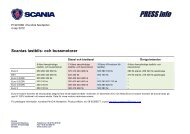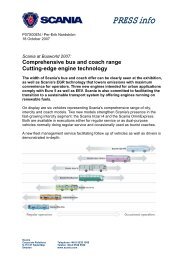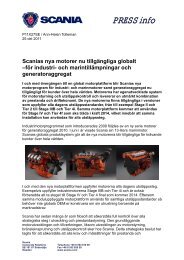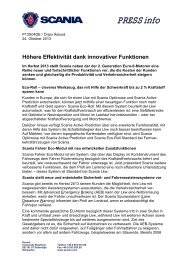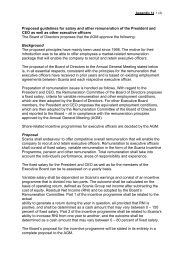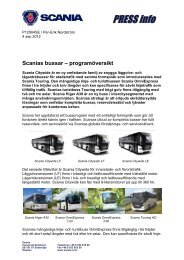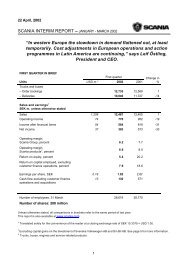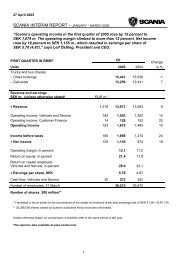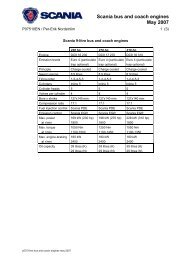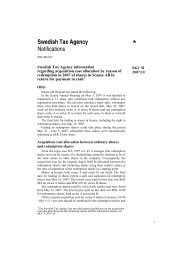Scania annual report 2003
Scania annual report 2003
Scania annual report 2003
You also want an ePaper? Increase the reach of your titles
YUMPU automatically turns print PDFs into web optimized ePapers that Google loves.
EUROPE<br />
Strong sales in several markets<br />
During <strong>2003</strong>, the demand for heavy<br />
trucks in western Europe was<br />
unchanged but maintained a higher<br />
level than during earlier economic<br />
slumps.<br />
Trucks in western Europe<br />
Western Europe accounts for nearly 70<br />
percent of <strong>Scania</strong>’s sales. Here vehicle<br />
standards are very strict and the most<br />
highly specified vehicles are sold. The<br />
transport industry and distribution systems<br />
are advanced, making reliability and maintenance<br />
key competitive factors and increasing<br />
the potential for sales of servicerelated<br />
products.<br />
Registrations in western Europe<br />
amounted to 213,000 heavy trucks, compared<br />
to 212,000 during 2002. <strong>Scania</strong>’s<br />
share of the western European market was<br />
14.0 (13.5) percent.<br />
In Great Britain, more heavy trucks<br />
were sold than in any previous year. A total<br />
of 34,303 new trucks were registered,<br />
which was 10 percent higher than in 2002.<br />
Several major orders from large transport<br />
companies helped <strong>Scania</strong> boost its market<br />
share, with continued profitability. For<br />
example, <strong>Scania</strong> sold 300 tractor units to<br />
the British convenience goods chain Safeway<br />
Stores plc. <strong>Scania</strong> is the price leader<br />
in Great Britain. Due to the weakening of<br />
the pound, <strong>Scania</strong> implemented price hikes<br />
that slowed order bookings late in the year.<br />
The German heavy truck market rose during<br />
<strong>2003</strong>, even though economic growth<br />
was negative. Many transport companies<br />
needed to update their fleets, while many<br />
used German trucks were exported to<br />
eastern Europe. The depressed German<br />
economy and uncertainty concerning<br />
German highway tolls created uncertainty<br />
among hauliers. Tough competition among<br />
truck manufacturers, mainly domestic<br />
ones, intensified.<br />
In Spain, the heavy truck market ended<br />
up at an all-time high, 26,757 units,<br />
and exceeded 25,000 heavy trucks for the<br />
fourth consecutive year. Behind these figures<br />
is the strong Spanish economy and<br />
Spanish transport companies that have<br />
become increasingly competitive internationally.<br />
<strong>Scania</strong>’s registrations increased by<br />
9 percent during the year.<br />
In the Netherlands, <strong>Scania</strong> signed<br />
agreements to deliver 533 four-axle allwheel-drive<br />
trucks to the Dutch armed<br />
forces. It is the largest-ever heavy truck<br />
order from the Dutch armed forces. The<br />
vehicles will be assembled at <strong>Scania</strong>’s production<br />
unit in Zwolle in the Netherlands<br />
and will be delivered during 2004 and<br />
2005.<br />
Full-coverage service network<br />
Sales of service-related products remained<br />
good during <strong>2003</strong>. In earlier years, acquisitions<br />
of sales and service facilities affected<br />
the growth rate. Today <strong>Scania</strong>, under<br />
its own auspices, has a service network<br />
that provides full coverage in western<br />
Europe. Future growth in service operations<br />
will mainly depend on the population<br />
of vehicles and their degree of utilisation.<br />
24-hour <strong>Scania</strong> Assistance<br />
All roadside assistance operations in<br />
Europe are now staffed exclusively by<br />
<strong>Scania</strong> employees. The 13 assistance<br />
centres each serve their region. Employees<br />
speak all the languages needed to<br />
connect Europe’s drivers with one of<br />
<strong>Scania</strong>’s more than 1,000 service workshops.<br />
Round the clock, every day of the<br />
year, <strong>Scania</strong>’s customers are the push<br />
of a button away from help in their own<br />
language, wherever in Europe they may<br />
be located.<br />
Trucks in central and eastern Europe<br />
Central and eastern Europe witnessed positive<br />
economic growth in <strong>2003</strong>. <strong>Scania</strong>’s<br />
truck order bookings in the region were at<br />
a high level. The enlargement of the European<br />
Union, as well as the transfer of<br />
manufacturing operations to the region<br />
from elsewhere, will probably contribute<br />
to continued economic growth and thus<br />
investments in infrastructure. The need for<br />
new heavy trucks is also increasing as<br />
western European logistics concepts are<br />
taking hold in central and eastern Europe.<br />
Transport companies in central European<br />
countries provide international<br />
haulage services to a higher degree than<br />
their counterparts in the EU. In countries<br />
like the Czech Republic, Slovakia, Slovenia<br />
and Bulgaria, more than half of cargo<br />
deliveries are to or from other countries.<br />
One clear trend in recent years is the<br />
sale of used heavy vehicles from western<br />
Europe to central and eastern Europe. An<br />
estimated 50,000 used heavy trucks and<br />
20,000 new ones were sold to central and<br />
eastern Europe during <strong>2003</strong>. In Russia,<br />
five to seven used trucks are sold for every<br />
new truck. At the same time, the market<br />
for new heavy trucks is growing. <strong>Scania</strong> is<br />
thus investing extensively in its service<br />
network in these countries.<br />
The increased flow of used vehicles<br />
from traditional markets in western Europe<br />
to new markets in eastern Europe signifies<br />
that Europe is becoming an increasingly<br />
integrated market.<br />
<strong>Scania</strong> strengthened its position in<br />
Russia as the leader in the imported truck<br />
segment, and volumes continue to climb.<br />
During the year, <strong>Scania</strong> expanded into the<br />
market east of the Urals, among other<br />
things by delivering 100 all-wheel-drive<br />
trucks to the Siberian oil company<br />
Surgutneftegaz.<br />
ANNUAL REPORT <strong>2003</strong> 36



